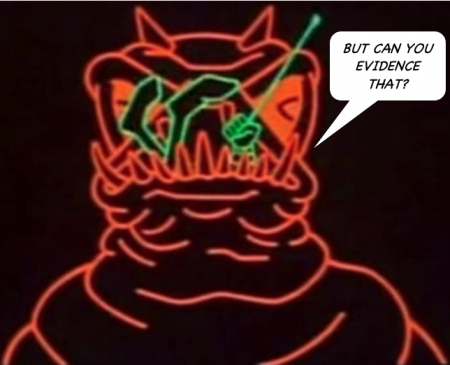Audit paradox: Difference between revisions
Amwelladmin (talk | contribs) No edit summary |
Amwelladmin (talk | contribs) No edit summary |
||
| Line 2: | Line 2: | ||
[[File:Ravenous bugblatter beast of Traal.png|450px|frameless|center]] | [[File:Ravenous bugblatter beast of Traal.png|450px|frameless|center]] | ||
}}{{Buchstein}}’s audit [[:Category:Paradox|paradox]] observes that, should you use workflow tools, [[legaltech]] and automation to carry out rudimentary tasks they will, by their nature, force you into sub-optimal behaviour patterns. In other words a tool that is meant to ''save'' work and ''reduce'' anxiety actually creates ''more'' of it. | }}{{Buchstein}}’s audit [[:Category:Paradox|paradox]] observes that, should you use workflow tools, [[legaltech]] and automation to carry out rudimentary tasks they will, by their nature, force you into sub-optimal behaviour patterns. In other words a tool that is meant to ''save'' work and ''reduce'' anxiety actually creates ''more'' of it. | ||
Congratulations: you have implemented a new technology solution to help you regularise your review and completion of [[confidentiality agreement]]<nowiki/>s. It has been calculated, costed, banked and factored into next year’s legal budget that this tool will<ref>It absolutely won’t — you know that, I know that, everyone except the COO knows that — but this is not the point of the story here so bear with us.</ref> save the equivalent of 1.5 headcounts over the | |||
The [[audit paradox]] is at the confluence of three streams of modern institutional thinking: | The [[audit paradox]] is at the confluence of three streams of modern institutional thinking: | ||
| Line 12: | Line 14: | ||
*[[Audit paradox]] | *[[Audit paradox]] | ||
*[[Substance and form]] | *[[Substance and form]] | ||
*[[Computer-based training]] | *[[Computer-based training]]{{Ref}} | ||
{{c|Paradox}} | {{c|Paradox}} | ||
Revision as of 15:08, 27 May 2022
|
JC pontificates about technology
An occasional series. 
|
Büchstein’s audit paradox observes that, should you use workflow tools, legaltech and automation to carry out rudimentary tasks they will, by their nature, force you into sub-optimal behaviour patterns. In other words a tool that is meant to save work and reduce anxiety actually creates more of it.
Congratulations: you have implemented a new technology solution to help you regularise your review and completion of confidentiality agreements. It has been calculated, costed, banked and factored into next year’s legal budget that this tool will[1] save the equivalent of 1.5 headcounts over the
The audit paradox is at the confluence of three streams of modern institutional thinking:
- The buttocractic oath: One’s first priority is to one’s own posterior. Primum nil errare: First, do no harm to your own career.
- Casanova’s advice: If in doubt, stick it in: it won’t do any harm to ask for contractual protections we don’t in point of fact, really need.
- The world consists of what can be measured: The ultra-reductionist view that as long as you can measure something you can control it, which bleeds into the converse, and entirely false, assumption, that if you can’t see it, it can’t be there.
Therefore an audit officer reminds us of the The Hitch-Hiker’s Guide to the Galaxy’s Ravenous Bugblatter Beast of Traal: a “mind-bogglingly stupid animal, it assumes that if you can’t see it, it can’t see you—daft as a brush, but very very ravenous”.
See also
- Audit paradox
- Substance and form
- Computer-based training==References==
- ↑ It absolutely won’t — you know that, I know that, everyone except the COO knows that — but this is not the point of the story here so bear with us.